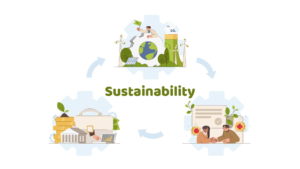Essential Sustainability Policies are not something of difficult things; rather, they promote progress and move companies toward a more sustainable future. Sustainable businesses are the benefit to ensure long-term prosperity.
People and Businesses are realizing the value of implementing sustainable practices more and more and this realization is based on several factors. Social responsibility and environmental issues dominate the information flow in the modern age.
Sustainability policies improve brand reputation, encourage staff involvement, and boost long-term profitability while improving the environment’s health. It benefits the businesses also and all businesses should put in place sustainability to prosper in the modern world.
Your influence as a business owner and choices have an impact on the environment and society on the whole. Adopting Sustainable business goals or taking Environmental responsibility is not just the right thing to do, but it is also a strategic chance to improve the financial performance of the business and effect positive change.
You have the skill to improve the value chain, earnings, and reputation of the company while also changing the world through the implementation of effective sustainable policies and programs.
However, everyone needs to Adopt sustainability as a strategic necessity to prosper the world.
Why Environmental Sustainability is important?

Environmental sustainability is important for several reasons, all of which emphasize how closely related the environment, society, and economies are.
Natural resource preservation is made possible by environmental sustainability, which makes sure that resources like biodiversity, clean water, air, and forests are kept for present and future generations. These resources are necessary to sustain life, to provide food, clean water, and habitats for wildlife, as well as to improve human welfare and the state of the economy.
Nonetheless, by lowering greenhouse gas emissions, supporting renewable energy sources, and putting energy-efficient methods into practice, environmental sustainability is essential to mitigating climate change.
Pollination, nitrogen cycling, flood control, and other vital functions that ecosystems perform are critical to sustaining biodiversity and human life. Ecosystem resilience and adaptability to environmental changes are ensured by environmental sustainability, which supports in their preservation and restoration.
Eco-friendly policies are the main part of Sustainable businesses and such policies have a profound impact on environmental conditions.
Human Health and Well-Being is another important factor. Human health and well-being depend on a clean and healthy environment. Green space preservation, sustainable agriculture, and air and water pollution reduction are examples of environmental sustainability initiatives or Environmental responsibility that promote public health, save healthcare expenses, and improve quality of life.
Furthermore, the Stability and resilience of the economy are intimately related to environmental sustainability. Eco-friendly policies like Resource efficiency, waste minimization, and investments in renewable energy are examples of sustainable practices that can result in financial savings, higher productivity, and new business prospects. Shifting to a green economy can lessen reliance on limited resources while nurturing innovation, job creation, and economic growth.
Essential Sustainability Policies For Good Environmental Health

Reduce, Reuse, and Recycle: To lessen the influence on the environment, waste reduction and recycling initiatives are put into place as Sustainable business goals.
Energy Efficiency: Establish objectives to minimize energy usage, make use of renewable energy sources, and improve operational energy efficiency.
Water conservation: putting policies in place to reduce the amount of water used, such as low-flow fixtures and water recycling where practical.
Sustainable Earning: Using environmentally friendly materials and collaborating with suppliers who share your commitment to environmental betterment.
Pollution prevention: Implementing Sustainable businesses strategies to reduce emissions and pollutants, such as efficient waste management and pollution control systems.
Fair labor practices: Ensuring equitable treatment, safe working conditions, and fair salary for all workers across the supply chain is one of the Essential Sustainability Policies.
Diversity and Inclusion: To develop a sense of community and encourage creativity, employers should support diversity and inclusion.

Community engagement: interacting with nearby communities to address social concerns and promote community development through partnerships, volunteer programs, and charitable activities.
Human Rights: Preserving the values of human rights, such as protecting workers’ rights, prohibiting discrimination, and opposing forced and child labor.
Health and Safety: By putting strong health and safety policies and procedures in place, employers, consumers, and communities’ health and safety should be given first priority.
Transparency, honesty, and responsibility are just a few of the ethical values and Sustainable business goals that guide ethical corporate conduct.
Long-Term Planning: in Essential Sustainability Policies, Using a long-term viewpoint to promote resilience and sustainable growth in corporate planning and decision-making.
Financial responsibility: handling of one’s money, which includes transparent financial reporting, cautious risk management, and sustainable investment strategies.
Developing a culture of innovation and ongoing development is essential to adjusting to shifting market conditions and new sustainability issues.
An important thing to note in Essential Sustainability Policies for Sustainable Businesses is the influence of business owners that goes beyond the boundaries of establishment. The choices have an impact on the environment and society at large.
Be it Management of the Sustainable Supply Chain, Programs for Energy Efficiency, Waste Minimization Techniques, Integration of social and environmental issues, or Development of Sustainable Products, it is important to acknowledge the relevance of environmental sustainability in the modern world.
Environmental sustainability is essential to the health of our world and future generations; it is not only a matter of choice. We can lessen the effects of climate change, safeguard biodiversity, maintain natural resources, and make sure that the earth is habitable for all by adopting sustainable behaviors.
At the end of the day, environmental sustainability is about Eco-friendly policies, Environmental responsibility, and building a better future for everyone, not only for preserving the environment. It’s about creating a world in which ecosystems, communities, and individuals all live in harmony. Each of us individuals, companies, and societies have a responsibility to advance environmental sustainability.
Let’s work together to create a future generation that lives in a more resilient, equitable, and sustainable environment with Essential Sustainability Policies.













